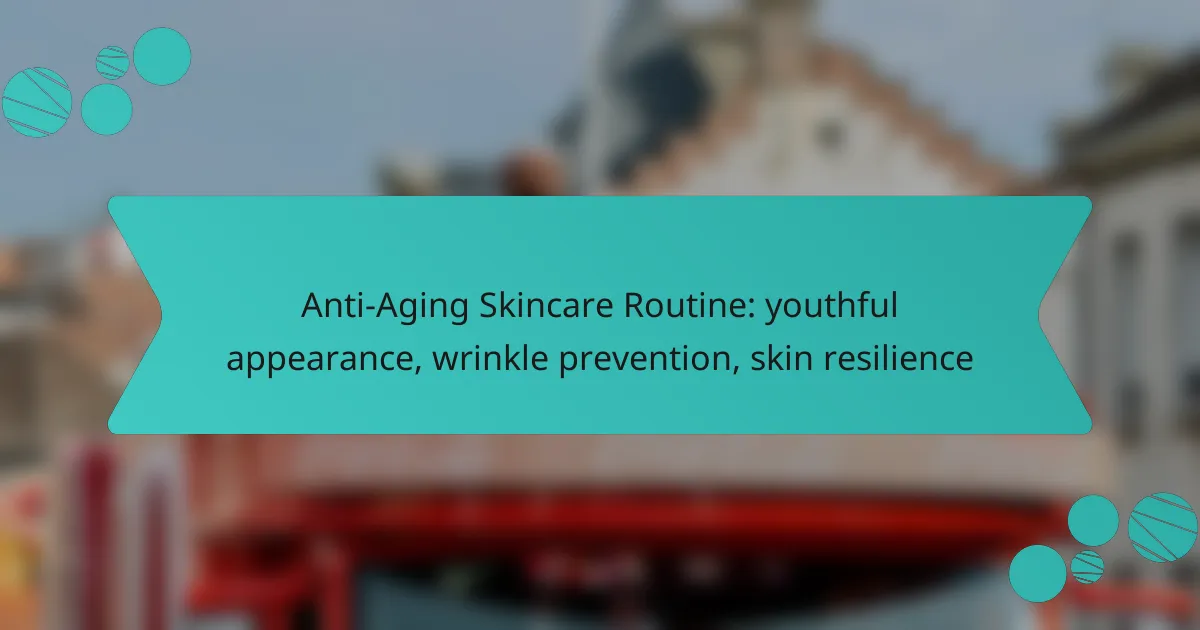Achieving a youthful appearance and preventing wrinkles requires a dedicated anti-aging skincare routine. By incorporating key products like retinol, vitamin C, and hyaluronic acid, you can enhance skin resilience and promote a radiant complexion. Consistent cleansing, exfoliating, moisturizing, and sun protection are essential steps in maintaining your skin’s vitality and youthfulness.

What are the best anti-aging skincare products in the UK?
The best anti-aging skincare products in the UK include retinol creams, vitamin C serums, hyaluronic acid moisturizers, peptide-based treatments, and SPF sunscreens. These products work together to enhance skin resilience, prevent wrinkles, and promote a youthful appearance.
Retinol creams
Retinol creams are renowned for their ability to stimulate collagen production and accelerate cell turnover, which helps reduce the appearance of fine lines and wrinkles. When selecting a retinol product, look for concentrations between 0.25% and 1% to find the right balance for your skin type.
Start by applying retinol once or twice a week to allow your skin to adjust, gradually increasing frequency as tolerated. Be mindful of potential irritation and always follow with a moisturizer to maintain hydration.
Vitamin C serums
Vitamin C serums are powerful antioxidants that protect the skin from free radicals while promoting collagen synthesis. Look for serums containing L-ascorbic acid at concentrations of 10% to 20% for optimal effectiveness.
Apply vitamin C serum in the morning before your moisturizer and sunscreen. This not only enhances skin brightness but also provides an added layer of protection against UV damage.
Hyaluronic acid moisturizers
Hyaluronic acid moisturizers are excellent for retaining skin moisture, which is crucial for maintaining a plump and youthful appearance. These products can hold up to 1,000 times their weight in water, making them ideal for hydration.
Incorporate a hyaluronic acid moisturizer into your daily routine, applying it after serums and before heavier creams. This helps lock in moisture and improves overall skin texture.
Peptide-based treatments
Peptide-based treatments support skin structure and elasticity by signaling cells to produce more collagen and elastin. Look for products that contain a blend of peptides for a synergistic effect on skin firmness and resilience.
Apply peptide treatments both morning and night for best results. Consistent use can lead to noticeable improvements in skin tone and texture over time.
SPF sunscreens
SPF sunscreens are essential in any anti-aging skincare routine as they protect against harmful UV rays that accelerate skin aging. Choose a broad-spectrum sunscreen with at least SPF 30 for daily use.
Apply sunscreen generously every morning, even on cloudy days, and reapply every two hours if outdoors. This simple step can significantly reduce the risk of sun damage and help maintain youthful skin.

How can I create an effective anti-aging skincare routine?
To create an effective anti-aging skincare routine, focus on cleansing, exfoliating, moisturizing, applying serums, and using sunscreen. Each step plays a crucial role in maintaining skin resilience, preventing wrinkles, and promoting a youthful appearance.
Cleanse daily
Cleansing your skin daily is essential for removing dirt, oil, and impurities that can contribute to aging. Use a gentle cleanser suited for your skin type, ideally one that contains hydrating ingredients to avoid stripping moisture.
Consider cleansing twice a day—once in the morning and once before bed. This routine helps maintain skin clarity and prepares it for subsequent products.
Exfoliate weekly
Exfoliating your skin weekly helps remove dead skin cells, promoting cell turnover and a brighter complexion. Choose a chemical exfoliant with alpha or beta hydroxy acids for a gentle yet effective approach.
Aim to exfoliate once or twice a week, depending on your skin’s sensitivity. Over-exfoliating can lead to irritation, so listen to your skin’s needs.
Apply serums
Serums are concentrated formulations that target specific skin concerns, such as fine lines and loss of elasticity. Look for serums containing antioxidants like vitamin C or hyaluronic acid for hydration and protection against environmental damage.
Apply serums after cleansing and before moisturizing. A few drops are usually sufficient, allowing for better absorption and effectiveness.
Moisturize regularly
Regular moisturizing is vital for maintaining skin hydration and elasticity. Opt for a moisturizer that suits your skin type, whether it’s lightweight for oily skin or richer for dry skin.
Apply moisturizer twice daily, ensuring it locks in moisture after applying serums. This step helps create a barrier that protects against external aggressors.
Use sunscreen
Using sunscreen is one of the most effective ways to prevent premature aging. Choose a broad-spectrum sunscreen with an SPF of at least 30, applying it daily, even on cloudy days.
Reapply sunscreen every two hours when outdoors, and consider using a moisturizer with SPF for added convenience. Protecting your skin from UV rays is crucial for maintaining a youthful appearance over time.

What are the benefits of using retinol for anti-aging?
Retinol is a powerful ingredient in anti-aging skincare that helps reduce the appearance of wrinkles and enhances skin resilience. It works by promoting cell turnover and stimulating collagen production, leading to a more youthful complexion.
Reduces fine lines
Retinol effectively minimizes fine lines by accelerating the skin’s natural exfoliation process. This ingredient encourages the shedding of dead skin cells, revealing smoother skin underneath. Regular use can lead to a noticeable decrease in the visibility of fine lines within a few weeks.
To maximize results, apply retinol in the evening, starting with a low concentration to allow your skin to adjust. Gradually increase usage as your skin becomes accustomed to the product.
Improves skin texture
Using retinol can significantly enhance skin texture by promoting a more even skin tone and reducing rough patches. It helps to unclog pores and diminish the appearance of enlarged pores, resulting in a smoother surface.
For best results, consider incorporating retinol into your nightly routine, and pair it with a gentle exfoliant to further enhance texture improvement. Always follow up with a moisturizer to prevent dryness.
Boosts collagen production
Retinol is known for its ability to stimulate collagen synthesis, which is crucial for maintaining skin elasticity and firmness. Increased collagen levels can help combat sagging and provide a more youthful appearance.
To support collagen production, use retinol consistently over time. Combining it with vitamin C in the morning can further enhance collagen benefits, as vitamin C is essential for collagen formation.

What role does diet play in skin aging?
Diet significantly influences skin aging by providing essential nutrients that promote a youthful appearance and enhance skin resilience. A balanced diet rich in specific foods can help prevent wrinkles and maintain skin health over time.
Antioxidant-rich foods
Antioxidant-rich foods combat oxidative stress, which contributes to skin aging. Fruits and vegetables such as berries, spinach, and carrots are excellent sources of antioxidants that help protect skin cells from damage.
Incorporating a variety of colorful produce into your meals can enhance your skin’s appearance. Aim for at least five servings of fruits and vegetables daily to maximize antioxidant intake.
Hydration importance
Staying hydrated is crucial for maintaining skin elasticity and preventing dryness, which can lead to wrinkles. Drinking adequate water daily, typically around 2 to 3 liters, helps keep skin plump and resilient.
In addition to water, consuming hydrating foods like cucumbers, oranges, and soups can further support skin hydration. Avoid excessive caffeine and alcohol, as they can dehydrate the skin.
Healthy fats for skin
Healthy fats, such as those found in avocados, nuts, and olive oil, are vital for maintaining skin barrier function and moisture. These fats help reduce inflammation and promote a smoother complexion.
Incorporating sources of omega-3 fatty acids, like fatty fish or flaxseeds, can also improve skin health. Aim for a balanced intake of healthy fats to support overall skin vitality and resilience.

How does sun exposure affect skin aging in the UK?
Sun exposure significantly accelerates skin aging in the UK by causing damage to collagen and elastin, leading to wrinkles and loss of skin elasticity. Regular exposure to UV rays, even on cloudy days, can contribute to premature aging, making sun protection essential for maintaining a youthful appearance.
UV damage effects
UV rays penetrate the skin and cause direct DNA damage, which can lead to mutations and skin cancers. Over time, this damage manifests as fine lines, wrinkles, and age spots, diminishing the skin’s overall resilience and vitality.
In the UK, the risk of UV damage is often underestimated due to the frequent cloud cover. However, UV radiation can still penetrate clouds, making it crucial to apply sunscreen daily, even in less sunny weather.
To mitigate UV damage, choose a broad-spectrum sunscreen with an SPF of at least 30, and reapply every two hours when outdoors. Additionally, wearing protective clothing and seeking shade during peak sun hours can further reduce the risk of skin aging.
